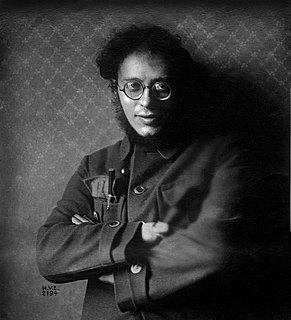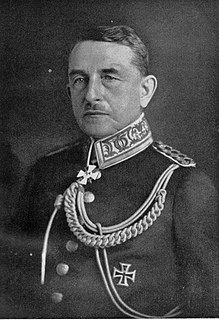
Theobald Theodor Friedrich Alfred von Bethmann Hollweg was a German politician who was the chancellor of the German Empire from 1909 to 1917. According to biographer Konrad H. Jarausch, a primary concern for Bethmann in July 1914 was the steady growth of Russian power, and the growing closeness of the British and French military collaboration. Under these circumstances he decided to run what he considered a calculated risk to back Vienna in a local small-scale war against Serbia, while risking a major war with Russia. He calculated that France would not support Russia. It failed when Russia decided on general mobilization, and his own army demanded the opportunity to use the Schlieffen Plan for quick victory against a poorly prepared France. By rushing through Belgium, Germany expanded the war to include the United Kingdom. Bethmann thus failed to keep France and Britain out of the conflict, which became the First World War.

Walther Rathenau was a Jewish-German industrialist, writer and liberal politician.

Elsa Brändström was a Swedish nurse and philanthropist. She was known as the "Angel of Siberia".

SS-OberführerErnst Boepple was a Nazi official and SS officer, serving as deputy to Josef Bühler in occupied Poland during World War II and the Holocaust, who was executed for war crimes.

Eugen Samuilovich "Jenő" Varga was a Soviet economist of Hungarian origin.
Carl Wilhelm, was a prolific German film director, film producer and screenwriter of the silent film era, at the end of which his career apparently entirely faded away and he vanished into obscurity.
Kurt Riezler was a German philosopher and diplomat. A top-level cabinet adviser in the German Empire and the Weimar Republic, he negotiated Germany's underwriting of Russia's October Revolution and authored the 1914 September Program which outlined German war aims during World War I. The posthumous publication of his secret notes and diaries played a role in the "Fischer Controversy" among German historians in the early 1960s.
Georg Alexander Kornelius Erich von Rauch (1904–1991) was a Baltic German historian specializing in Russia and the Baltic states.

Ruth Fischer was an Austrian and German Communist and a co-founder of the Austrian Communist Party in 1918. She later became a staunch anti-Stalinist activist.
Arkadi Maslow, born Isaak Yefimowich Chemerinsky was a communist politician.

Paul Oskar Höcker was a German editor and author, who also wrote under the pseudonym Heinz Grevenstett. He was one of the 88 signatories of the 1933 proclamation of loyalty to Adolf Hitler, the Gelöbnis treuester Gefolgschaft.
Emil Rameau was a German film and theatre actor, and for many years the deputy artistic director at the Schiller Theater. He appeared in nearly 100 films between 1915 and 1949.
Adolf Immanuel Mathäus Winkler was a pastor in Hoffnungstal and author. During World War I, Winkler worked for the rights of Germans in Russia.

Karl Berngardovich Radek was a Marxist active in the Polish and German social democratic movements before World War I and an international Communist leader in the Soviet Union after the Russian Revolution.

Heinrich Albert Schnee was a German lawyer, colonial civil servant, politician, writer, and association official. He served as the last Governor of German East Africa.
Hans Friedrich Wilhem Ernst von Raumer was a German politician of the German People's Party (DVP). He served as minister in two governments of the Weimar Republic and was also active as a representative of German industry.

Alfons Goldschmidt was a German Journalist, economist and university lecturer.
Frida Rubiner was a political activist (KPD), writer, journalist and translator of important communist Russian texts into German. Pseudonyms under which she wrote included Georg Rehberg, Arnold Brand and Frida Lang.
Mieczysław Broński was a Russian-Polish communist, Soviet diplomat, economist and academic, and a victim of the Great Purge.

Ewald Ammende was an Estonian journalist, human rights activist and politician of Baltic German origin.











